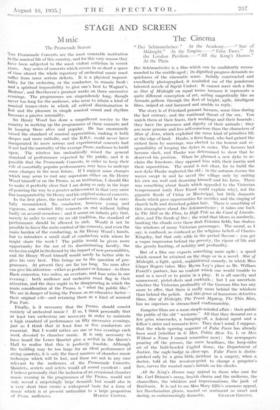STAGE AND SCREEN
Music The Promenade Season Tun ProMenade Concerts are the most venerable institution in the musical life of this country, and for this very reason they have been subjected to the most violent criticism in recent years: Any series of concerts which covers in so short a space of time .almOst the whole repertory of orchestral music must suffer from Some serious defects. It is a physical impossi- bility for the orchestra, or the conductor, to remain fresh : and a. spiritual impossibility to give one's 'best to Wagner's, Brahms', and Beethoven's greatest works on three successive ,evenings. The programmes are stupendously long, though never too long for the audience, who seem to attain a kind of musical trance-state in which all critical discrimination is lost and the pleagure in simple musical sound and rhythm becothes' a passive sensuality. Sir Henry Wood has done a magnificent service to the country in -working up the programmes of these concerts and in keeping them alive and popular. He has enormously 'raised the standard of musical appreciation, making it both deeper and more catholic, and the B.B.C. could never have inaugurated its more serious and experimental concerts had it not had the mentality of the average Prom. audience to build tipon. The wireless has undoubtedly raised the general standard of performance expected by the public, and it is possible that the Promenade Concerts, in order to keep their role of essentially popular performances, may have to undergo some changes in the near future. If I suggest some changes which may seem to cast any aspersions either on Sir Henry Wood himself' or on the Proms. as an institution, I should like to make it perfectly clear that I am doing so only in the hope of pointing the way to a greater achievement in that very same line inaugurated by Sir Henry and his original series of concerts. - In thefirst place, the matter of conductors should be care- fully reconsidered. No conductor, however young and vigorous, can conduct fifty concerts on end vvithOut failing badly on several occasions : and it seems an infinite pity that, merely in order to carry on an old tradition, the standard of 'performance ghould be allowed to sink. Would it not be possible to leave' the main control of the concerts, and even the main burden 'of the conducting, in Sir Henry Wood's hands, but to introduce a small staff of conductors with whom he might share the work ? The public would be given more opportunity for the use of its discriminating faculty, the orchestra jpight be freshened by the impact of new personalities,, and .Sir Henry Wood himself would surely be better able to give his very best. This brings me to the question of pro- grammes. , At present they are far too long. No man alive can give his attention—either as performer or listener—to three Bach concertos, two suites, an overture, and four arias in one evening :' both audience and orchestra must flag in their attention, and the days ought to be disappearing in which the main consideration at the Proms. is " what the public like." We are in danger of losing the Proms. as an educative factor— their original. role—and retaining them as a kind of musical tun Fair. • Finally, is it necessary that the Proms. should consist entirely of orchestral music ? If so, I think personally that at least two orchestras are necessary in, order to maintain a high standard of performance on fifty successive evenings,
just' as I think that at least four or five conductors are essential. But I would rather see one or two evenings each week devoted to chamber music. It is only necessary to have heard the Lener Quartet give a recital in the Queen's Hall to realize that this is perfectly feasible. Although the building .may be, too' large: for an ideal performance of string quartets,, it is only the finest nuances of chamber music technique which will be lost, and these are not in any case relevant to the audiences, of the Promenade Concerts.
QUintets, sextets and octets would all sound ,excellent : and I believe personally that the inclusion a an occasional chamber Music evening' in the programmes of the Proms. would not only reveal a surprisingly large' demand, but would also in 'a very short time create a widespread taste for a form of music which is at present, unfamiliar to a large. proportion


































 Previous page
Previous page